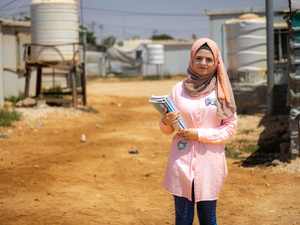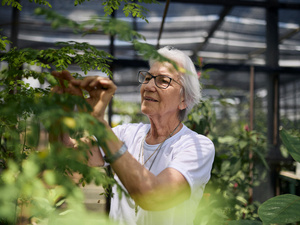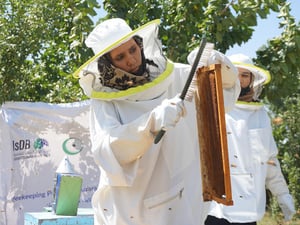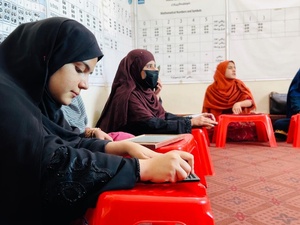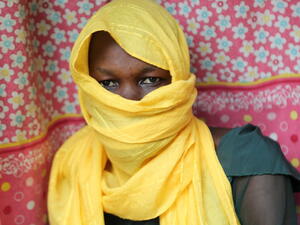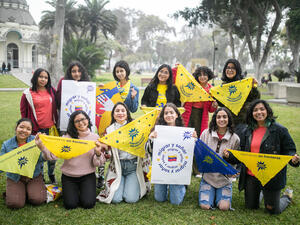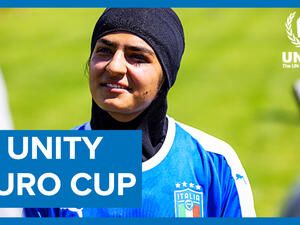Returnees key players in Afghanistan's battle of the airwaves
Returnees key players in Afghanistan's battle of the airwaves
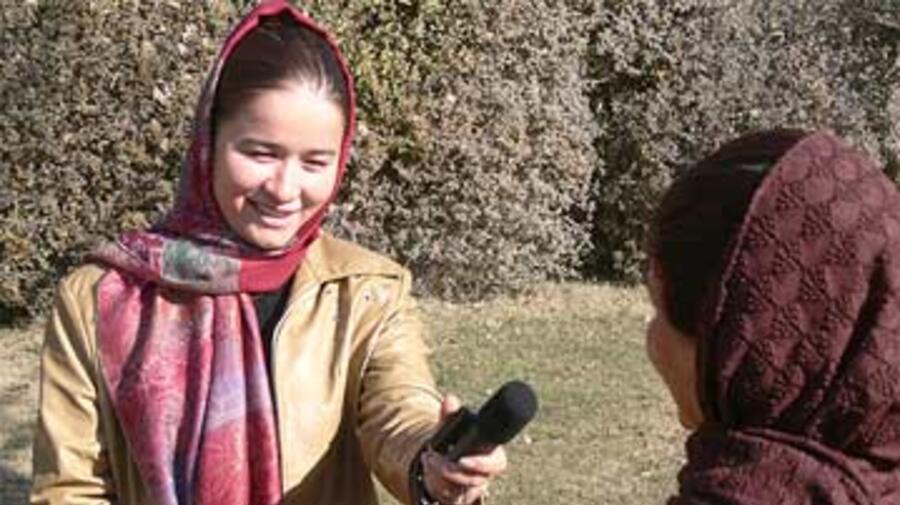
From refugee to radio host: Once forced to flee Afghanistan, Neelab Ahmadi is now one of the country's leading radio presenters.
KABUL, Afghanistan, December 21 (UNHCR) - The decades of violence which devastated Afghanistan have ended, but across the country a new battle is being waged. It is a campaign fought in the simple mud homes of the country's rural farmers and in the garish mansions of Kabul's newly-rich.
Under the Taliban anyone found owning a television would certainly have been beaten and would quite likely have been imprisoned. Today, Afghans face an unprecedented number of television and radio stations competing for their attention, and many of the leading figures in this broadcasting war are former refugees.
In west Kabul, site of a viciously contested front line during Afghanistan's civil war, Feriba Charkhi discusses the coming week's programming with the technical staff of Aryana Television. Feriba is one of the station's best known presenters and, as executive producer, is also responsible for Aryana's more than 30 programmes.
Nine years ago, as the Taliban took control of Kabul and much of the country, Fariba, a married mother of three, fled with her family to Peshawar in Pakistan. For five years they lived as refugees, performing odd jobs and planning for the day when they could return. In early 2002, they were among the first to make the journey home to post-Taliban Afghanistan under the UN refugee agency's organized repatriation operation.
State-run Radio-Television Afghanistan, previously restricted to a single radio station broadcasting religious discussions and readings from the Koran, had resumed its television service and was in need of on-air talent.
"There was a sudden demand for women in the media," says Fariba. "But most women were not even willing to present radio programmes, and certainly not television, for fear of being recognized."
Fariba was soon appearing on television screens across the country. Her decision to play a role in the country's emerging media was supported by her husband, but many were opposed. "In the early days, strangers would come up to me on the street and insult me. Even my family said the time was not yet right for women to be so visible. Now, if some one approaches me it's to pay a compliment or to comment on our programmes."
Aryana is one of four private stations currently broadcasting in Afghanistan, with a fifth due to go on air in the coming months. All but one of them have been operating for under a year, which makes the staff of TV Tolo - or Dawn - veterans of the country's rapidly changing media landscape. Broadcasting since 2004, Tolo was launched following the earlier success of its sister station Radio Arman - or Hope.
Neelab Ahmadi began working at Radio Arman a year ago, after spending nearly a third of her life as a refugee in Iran. In 2003, with the assistance of UNHCR, she and her family returned to Kabul where the fluent English speaker was able to work as a translator. After securing a part-time job with Radio Arman, she went on to become the station's first woman presenter of the peak evening time-slot and now hosts a nightly three-hour programme that combines music with phone-ins from listeners.
"At first people complained a lot about our programmes," she says, recalling the turbulent early days of Afghanistan's first private radio station. "They didn't like the music we played, and they particularly didn't like male and female presenters chatting and laughing with each other live on air."
Calls to the station today are more often to make a song request than to complain about supposed inappropriate behaviour. Neelab's contact with a largely young audience has made her keenly aware of how much has changed in Afghanistan, and how much still needs to. "Everyone has a mobile phone now, so they can call and tell us about their lives. We still get many calls from young girls who say their families won't let them out or attend school."
Returning to Kabul from Tehran, the modern Iranian capital, Neelab and her family were confronted with a way of life very different from the one they had experienced over the previous seven years. Neelab's adolescence had been spent surrounded by radio and television programmes, and she had worked on a magazine aimed at Afghan refugees. The absence of such outlets in her own country was striking.
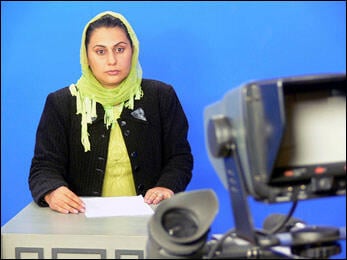
Fariba Charkhi, a presenter with Aryana Teleivsion in Kabul and a former refugee, was one of the first women to appear on Afghan television after the collapse of the Taliban.
In Kabul and across the country that void is rapidly being filled, and for Neelab and the other returnees working with her at Radio Arman, coming home has provided an opportunity to be a part of an industry that is profoundly affecting Afghanistan.
In the offices of Aryana Television, Feriba Charkhi is confident that the media can be a positive force for change. "I strongly believe that we're moving in the right direction," she says as she enters the studio. "Through our programmes we can inform people's lives and influence their opinions. That's something I want to be a part of, and I'm proud of what I do."
By Tim Irwin in Kabul, Afghanistan

